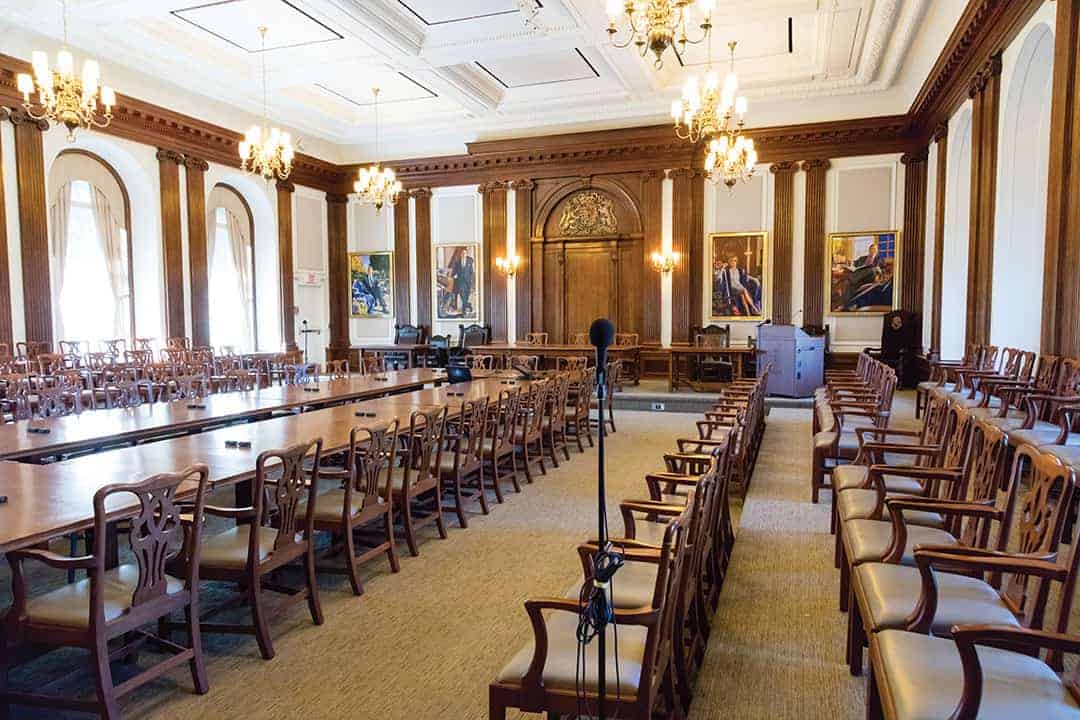On December 15, U of T’s Governing Council approved revisions to the Policy on Sexual Violence and Sexual Harassment. The university had announced the proposed revisions over the summer, following the 2021–2022 review of the policy.
Policy history
During the Governing Council meeting, Sandy Welsh — vice-provost, students — provided background information on the policy’s review process.
In 2016, the Ontario government passed legislation requiring all postsecondary institutions to create their own sexual violence policies. The Governing Council approved U of T’s original Policy on Sexual Violence and Sexual Harassment in December, 2016.
Welsh explained that the provincial legislation requires the university to review its sexual violence policy every three years and amend that policy as necessary. U of T’s first review took place in 2019 and resulted in minor changes to the policy’s language and the university’s operations.
The second review, which resulted in the revisions that were up for approval at the Governing Council meeting on December 15 involved extensive consultations with more than 700 student, staff, faculty, and librarian participants. The review chairs consolidated the feedback from these consultations into 12 main recommendations, which the administration accepted in July.
Some of the 12 proposed revisions — specifically the seventh recommendation — had previously elicited concerns from some members of the U of T community. It proposed that the university establish formal supports for those accused of sexual violence or harassment.
Back in August, Micah Kalisch — founder and director of the Prevention, Empowerment, Advocacy, Response, for Survivors (PEARS) Project — explained in an interview with The Varsity that this recommendation “really raised some flags about the prevalence of professors and faculty being accused of sexual violence.” Furthermore, they called for more supports for survivors of sexual violence.
This fall, following the collection of feedback via an online form, three other revisions to the policy were added. First, as a result of a recommendation that the PEARS project proposed, the updated policy would require U of T to publicize statistical information on sexual violence cases at the university in an annual report. The revisions also use stronger language for nontolerance of reprisals or retaliation against those who report sexual violence, whom the policy refers to as “complainants.”
The update also lays out clearer expectations for nonadjudicative processes — in which a neutral facilitator and the “complainant” and “respondent” discuss possible resolutions.
Student concerns
Janet Ecker, the chair of the Governing Council, confirmed that six external individuals requested to speak at the meeting but only five were approved. The approved speakers included representatives from the University of Toronto Students’ Union, the University of Toronto Mississauga Students’ Union (UTMSU), the Scarborough Campus Students’ Union (SCSU), the Association of Part-Time Undergraduate Students, and the PEARS Project. The SCSU representative was not present at the meeting.
On November 20, an article published in The Varsity revealed that, according to an external investigation, UTM Professor Robert Reisz had violated the university’s sexual harassment policy. Following the article, the PEARS Project released an open letter calling on the university to terminate Reisz. The open letter has received over 1,800 signatures so far.
During the Governing Council meeting, Reagan Roopnarine, UTMSU’s vice-president equity, called out the university’s lack of transparency and questioned why, as a woman of colour, she and her colleagues still work five minutes away from Reisz’s office.
Kalisch brought their colleagues to stand with them when they spoke in front of the council. “This policy and these recommendations do not do enough. They do not keep us safe, they do not hold perpetrators accountable, and they do not support or protect survivors,” said Kalisch.
Kalisch asked the Governing Council to vote against the recommendations. They asked that the council demand that the university hire a gender-based violence expert to conduct an unbiased review of the policy and “create substantial change which is trauma-informed, survivor-centric, and actually keeps us safe.”
In October, the PEARS Project held a protest called “Too Little Too Late,” which challenged U of T’s response to the policy review and included a silent sit-in outside the office of U of T President Meric Gertler.
Next steps
In response to a question about why Reisz is still employed at U of T and the specific details of corrective action undertaken by U of T, Cheryl Regehr, vice-president and provost, said that the university is working to increase transparency, but its actions are hampered by employment law.
Some Governing Council members questioned why the university hadn’t sought an external assessment of the policy, as recommended by PEARS. Regehr explained that the university doesn’t generally involve external actors as part of reviewing their policies.
Susan Froom, an elected part-time undergraduate student governor, suggested that the university ask the Office of the Ombudsperson or an external actor to submit a written critique of the policy during the next review process. According to Regehr, the university “can certainly take that [suggestion] into consideration.”
The revised Policy on Sexual Violence and Sexual Harassment will come into effect January 1, 2023.
The next review of the Policy is set to occur in 2025.
If you or someone you know has been affected by sexual violence or harassment at U of T:
- Visit safety.utoronto.ca for a list of safety resources.
- Visit svpscentre.utoronto.ca for information, contact details, and hours of operation for the tri-campus Sexual Violence Prevention & Support Centre. Centre staff can be reached by phone at 416-978-2266 or by email at [email protected].
- Call Campus Safety Special Constable Service to make a report at 416-978-2222 (for U of T St. George and U of T Scarborough) or 905-569-4333 (for U of T Mississauga)
- Call the Women’s College Hospital Sexual Assault and Domestic Violence Care Centre at 416-323-6040
- Call the Scarborough Grace Sexual Assault Care Centre at 416-495-2555
- Call the Assaulted Women’s Helpline at 866-863-0511


